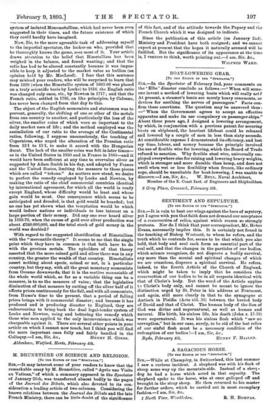SENTIMENT AND SEPULTURE. [To THE EDITOR OF THE " SPECTATOR:]
Sin,—It is vain to beat our wings against the bars of mystery, yet I agree with you that faith does not demand our acceptance of a resurrection of relics, against which reason so strongly protests. Nor do I think that your correspondent, Mr. Heber Evans, necessarily implies this. It is certainly not found in the teaching of Bishop Westhott, to whom he refers, and the truth which he contends for, seems to be that which you also hold, that body and soul each form an essential part of the real self, and that the changes in the particles of our bodies, which science recognises, do not disprove a bodily survival, any more than the mental and spiritual changes of which we are conscious, disprove a spiritual eurvivaL He refers, indeed, to the fourth Article of the Church of England, which might be taken to imply that he considers the resurrection of our bodies to be in all respects identical with that of Christ's body. But the word of the Article applies to Christ's body only, and cannot be meant to ignore the distinction urged by St. Peter in his address at Pentecost, and again, still more clearly in that to the synagogue at Antioch in Pisidia (Acts xiii. 36) between the buried body of David and that of Christ. The human body of the Son of God was divine and supernatural, as well as human and natural. His birth, his sinless life, his death (John x. 17-18) were supernatural. It was his sinless flesh which "saw no corruption," but in our case, surely, to be rid of the last relics of our sinful flesh must be a necessary condition of the redemption of our bodies !—I am, Sir, &c.,






































 Previous page
Previous page